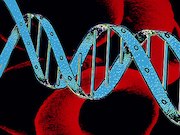Genetic status linked to risk of major adverse cardiac events in NCCM patients
WEDNESDAY, Feb. 14, 2018 (HealthDay News) — Genetic stratification should play a role in clinical care of patients with noncompaction cardiomyopathy (NCCM), according to a study published in the Feb. 20 issue of the Journal of the American College of Cardiology.
Jaap I. van Waning, M.D., from Erasmus Medical Center in the Netherlands, and colleagues compared clinical features and major adverse cardiac events (MACE) during follow-up among 327 unrelated NCCM patients (adults and children) in three categories: with a genetic mutation (32 percent of patients); probably genetic, familial cardiomyopathy, without a mutation (16 percent); or sporadic, no family history, without a mutation (52 percent).
The researchers found that MYH7, MYBPC3, and TTN mutations were the most common mutations (71 percent) found in genetic NCCM. For genetic patients, the risk of having reduced left ventricular systolic dysfunction was higher compared with the probably genetic and sporadic cases; the highest risk was seen in patients with multiple mutations and TTN mutations. Children more frequently had mutations, which were associated with MACE. Sporadic NCCM was more likely in adults. Patients with MYH7 mutations had low risk for MACE.
“NCCM is a heterogeneous condition, and genetic stratification has a role in clinical care,” the authors write. “Distinguishing genetic from nongenetic NCCM complements prediction of outcome and may lead to management and follow-up tailored to genetic status.”
Editorial (subscription or payment may be required)
Copyright © 2018 HealthDay. All rights reserved.








